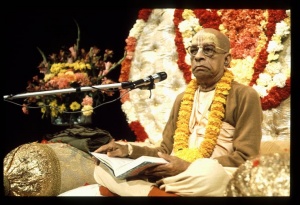SB 9.23.24: Difference between revisions
m (1 revision(s)) |
(Vanibot #0018 edit: make synonym terms in Sanskrit italic in SB - Vanisource) |
||
| Line 1: | Line 1: | ||
{{info | {{info | ||
|speaker= | |speaker=Śukadeva Gosvāmī | ||
|listener=King | |listener=King Parīkṣit | ||
}} | }} | ||
[[Category:Srimad-Bhagavatam - Canto 09 Chapter 23]] | |||
[[Category:Bhagavatam Verses Spoken by Sukadeva Gosvami - Vanisource|092324]] | |||
<div style="float:left">'''[[Srimad-Bhagavatam]] - [[SB 9|Ninth Canto]] - [[SB 9.23: The Dynasties of the Sons of Yayati|Chapter 23: The Dynasties of the Sons of Yayāti]]'''</div> | |||
<div style="float:right">[[File:Go-previous.png|link=SB 9.23.23]] '''[[SB 9.23.23]] - [[SB 9.23.25]]''' [[File:Go-next.png|link=SB 9.23.25]]</div> | |||
{{RandomImage}} | |||
==== TEXT 24 ==== | ==== TEXT 24 ==== | ||
<div | <div class="verse"> | ||
arjunaḥ kṛtavīryasya | :arjunaḥ kṛtavīryasya | ||
sapta-dvīpeśvaro 'bhavat | :sapta-dvīpeśvaro 'bhavat | ||
dattātreyād dharer aṁśāt | :dattātreyād dharer aṁśāt | ||
prāpta-yoga-mahāguṇaḥ | :prāpta-yoga-mahāguṇaḥ | ||
</div> | </div> | ||
| Line 17: | Line 22: | ||
==== SYNONYMS ==== | ==== SYNONYMS ==== | ||
<div | <div class="synonyms"> | ||
''arjunaḥ''—Arjuna; ''kṛtavīryasya''—of Kṛtavīrya; ''sapta-dvīpa''—of the seven islands (the whole world); ''īśvaraḥ abhavat''—became the emperor; ''dattātreyāt''—from Dattātreya; ''hareḥ aṁśāt''—from he who was the incarnation of the Supreme Personality of Godhead; ''prāpta''—obtained; ''yoga-mahāguṇaḥ''—the quality of mystic power. | |||
</div> | </div> | ||
| Line 24: | Line 29: | ||
==== TRANSLATION ==== | ==== TRANSLATION ==== | ||
<div | <div class="translation"> | ||
The son of Kṛtavīrya was Arjuna. He [Kārtavīryārjuna] became the emperor of the entire world, consisting of seven islands, and received mystic power from Dattātreya, the incarnation of the Supreme Personality of Godhead. Thus he obtained the mystic perfections known as aṣṭa-siddhi. | The son of Kṛtavīrya was Arjuna. He [Kārtavīryārjuna] became the emperor of the entire world, consisting of seven islands, and received mystic power from Dattātreya, the incarnation of the Supreme Personality of Godhead. Thus he obtained the mystic perfections known as aṣṭa-siddhi. | ||
</div> | </div> | ||
__NOTOC__ | |||
<div style="float:right; clear:both;">[[File:Go-previous.png|link=SB 9.23.23]] '''[[SB 9.23.23]] - [[SB 9.23.25]]''' [[File:Go-next.png|link=SB 9.23.25]]</div> | |||
__NOTOC__ | |||
__NOEDITSECTION__ | |||
Revision as of 10:40, 1 December 2017

His Divine Grace
A.C. Bhaktivedanta Swami Prabhupada
A.C. Bhaktivedanta Swami Prabhupada
TEXT 24
- arjunaḥ kṛtavīryasya
- sapta-dvīpeśvaro 'bhavat
- dattātreyād dharer aṁśāt
- prāpta-yoga-mahāguṇaḥ
SYNONYMS
arjunaḥ—Arjuna; kṛtavīryasya—of Kṛtavīrya; sapta-dvīpa—of the seven islands (the whole world); īśvaraḥ abhavat—became the emperor; dattātreyāt—from Dattātreya; hareḥ aṁśāt—from he who was the incarnation of the Supreme Personality of Godhead; prāpta—obtained; yoga-mahāguṇaḥ—the quality of mystic power.
TRANSLATION
The son of Kṛtavīrya was Arjuna. He [Kārtavīryārjuna] became the emperor of the entire world, consisting of seven islands, and received mystic power from Dattātreya, the incarnation of the Supreme Personality of Godhead. Thus he obtained the mystic perfections known as aṣṭa-siddhi.